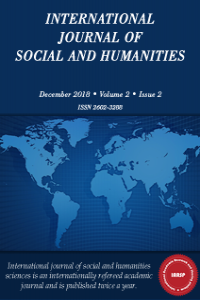Öz
The present
paper brings attention to the importance of humanities in shaping a better
world. Human sciences are a reliable means of order without which the human
thinking might be even more disorderly than it is. The problem is to keep it in
motion, to prevent the dominant realms of scientific thought of damaging the
emotional attributes of human lives. Another problem is to make it yield to the
critical crises of the modern austere world. Tom Stoppard’s Arcadia reveals that it is only in the
equation of love, that order can be found. The line between emotion and reason
has been mirrored in the relationship between Thomasina and Septimus and arises
out of the human emotions between the other characters especially Hannah and
Bernard. The waltz scene engages the reader in an implicit dialogue between
science and humanities. It comes to symbolize the healing effect of arts. Just
right before her tragic death Thomasina dances with Septimus in a dance which
proves that science and mathematics without love and humanities may lead to the
tragic ending of the universe.
And, as the
play shows it, the final scene of waltz intertwines the past and the present.
It alternates between the pastoral past of romanticism and emotions and the
present of technological progress to show us that knowledge is only complete
when emotions and reason are matched. Accordingly, the future of chaotic
behaviour in this ambiguous world, is not a random reality, it results from
that conflict between reason and emotion. The victory of emotion at the end of
the play (the final dance between characters ) proves that human sciences,
ranging from music, poetry, drama, paintings etc, have been always in motion
and thanks to them one’s humanity is fulfilled . Arts and emotions illuminate
and heal the suffocating patterns underlying the chaotic human life. As a
“science play” entwined with a unique love story, Tom Stoppard’s Arcadia intends to highlight the fact
that the peculiar nature of the human self can be only mirrored in the realm of
the artistic thought. Needless to say, that even the power of scientific
thinking can be truly achieved through active human sciences. In this respect,
this paper will examine and highlight the duality of reason and emotions in Tom
Stoppard’s Arcadia. It will shed
lights on their ultimate relation to the mobility of humanities reflected in
the themes and language of the play. To deal with these ideas in a thorough
way, I will analyze the play in the light of a thematic study.
Kaynakça
- Stoppard, Tom. Arcadia. London: Faber and Faber, 2008.
- Baker, William. The Real Thing: Essays on Tom Stoppard in Celebra-tion of this 75th Birthday. London: Cambridge Scholars Publishing, 2013.
- Fleming, John. Tom Stoppard’s Arcadia. London: Continuum Interna-tional Publishing Group, 2008.
- Gale. A Study Guide for Tom Stoppard’s Arcadia. London: Drama for Studies, 2008.
- H, Kellert. Borrowed Knowledge: Chaos Theory and the Challenge of Learning Across Disciplines. Chicago and London: The University of Chica-go Press, 2008.
- Purse, Niguel. Tom Stoppard’s Plays: Patterns of Plenitude and Parsi-mony. London: Chester Academic Press, 2009.
- Niederhoff, Burckhardt. “Fortuitous Wit: Dialogue and Epistemology in Tom Stoppard’s
- Arcadia”. London: Connotations: A Journal for Critical Debate. Vol1, 2011.
Öz
Kaynakça
- Stoppard, Tom. Arcadia. London: Faber and Faber, 2008.
- Baker, William. The Real Thing: Essays on Tom Stoppard in Celebra-tion of this 75th Birthday. London: Cambridge Scholars Publishing, 2013.
- Fleming, John. Tom Stoppard’s Arcadia. London: Continuum Interna-tional Publishing Group, 2008.
- Gale. A Study Guide for Tom Stoppard’s Arcadia. London: Drama for Studies, 2008.
- H, Kellert. Borrowed Knowledge: Chaos Theory and the Challenge of Learning Across Disciplines. Chicago and London: The University of Chica-go Press, 2008.
- Purse, Niguel. Tom Stoppard’s Plays: Patterns of Plenitude and Parsi-mony. London: Chester Academic Press, 2009.
- Niederhoff, Burckhardt. “Fortuitous Wit: Dialogue and Epistemology in Tom Stoppard’s
- Arcadia”. London: Connotations: A Journal for Critical Debate. Vol1, 2011.
Ayrıntılar
| Birincil Dil | İngilizce |
|---|---|
| Bölüm | Araştırma Makalesi |
| Yazarlar | |
| Yayımlanma Tarihi | 10 Aralık 2018 |
| Yayımlandığı Sayı | Yıl 2018 Cilt: 2 Sayı: 2 |

